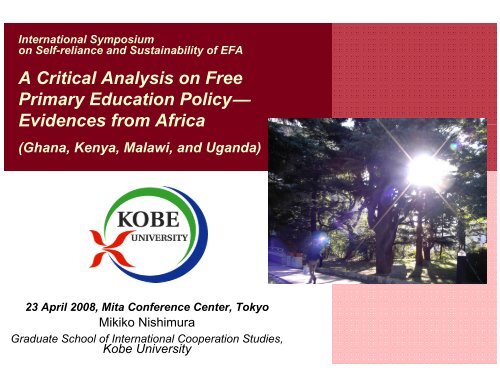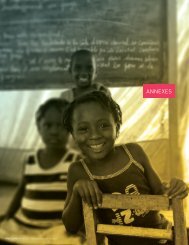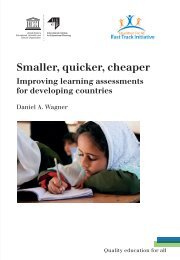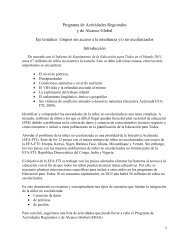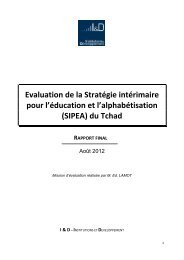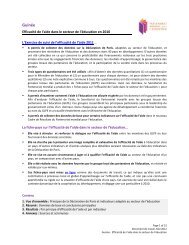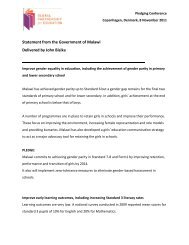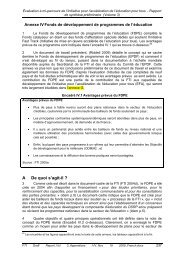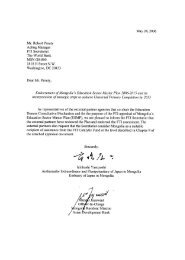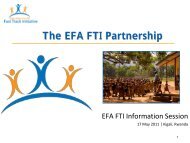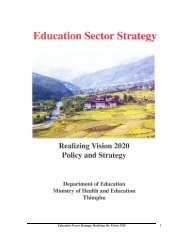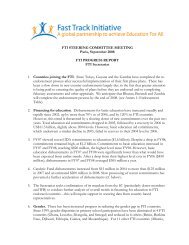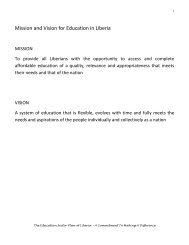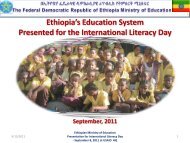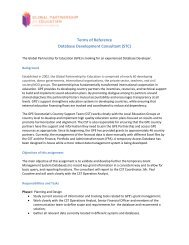A Critical Analysis on Free Primary Education Policy― Evidences ...
A Critical Analysis on Free Primary Education Policy― Evidences ...
A Critical Analysis on Free Primary Education Policy― Evidences ...
Create successful ePaper yourself
Turn your PDF publications into a flip-book with our unique Google optimized e-Paper software.
Internati<strong>on</strong>al Symposium<br />
<strong>on</strong> Self-reliance and Sustainability of EFA<br />
A <str<strong>on</strong>g>Critical</str<strong>on</strong>g> <str<strong>on</strong>g>Analysis</str<strong>on</strong>g> <strong>on</strong> <strong>Free</strong><br />
<strong>Primary</strong> Educati<strong>on</strong> <strong>Policy―</strong><br />
<strong>Evidences</strong> from Africa<br />
(Ghana, Kenya, Malawi, and Uganda)<br />
23 April 2008, Mita C<strong>on</strong>ference Center, Tokyo<br />
Mikiko Nishimura<br />
Graduate School of Internati<strong>on</strong>al Cooperati<strong>on</strong> Studies,<br />
Kobe University
■C<strong>on</strong>tent of the Presentati<strong>on</strong><br />
1. Background of the research<br />
2. Research focus and methodologies<br />
3. Findings<br />
4. <str<strong>on</strong>g>Critical</str<strong>on</strong>g> reflecti<strong>on</strong><br />
1<br />
Copyright (C) 2006 Kobe University. All Rights Reserved.
■ Background of the Research<br />
■UPE Policy in in the the form of of fee fee aboliti<strong>on</strong> as as popular interventi<strong>on</strong><br />
for for achieving EFA since the the mid-1990s (Avenstrup, et et al. al. 2004)<br />
■Lack of of review <strong>on</strong> <strong>on</strong> the the past experiences and analytical studies <strong>on</strong> <strong>on</strong><br />
its its impacts and challenges (Allis<strong>on</strong>, 1983; Bray, 1986; Prince,<br />
1997; Deininger, 2003; Sifuna, 2007; Nishimura, et et al.2008).<br />
■Need for for the the broad based understanding of of financial and<br />
administrative systems for for sustainable educati<strong>on</strong>al development in in<br />
sub-Saharan Africa.<br />
■Criticisms <strong>on</strong> <strong>on</strong> the the uniformity of of the the educati<strong>on</strong>al policies (Samoff,<br />
1999; Foster, 2000; Brown, et et al, al, 2001; Klees, 2001).<br />
2<br />
Copyright (C) 2006 Kobe University. All Rights Reserved.
■Members of the Research Activities<br />
Network of the Africa-Asia University Dialogue Project supported by<br />
Hiroshima University, JICA, UNESCO, and UNU<br />
Country<br />
Kenya<br />
Malawi<br />
Ghana<br />
Uganda<br />
Regi<strong>on</strong>al<br />
Advice<br />
In Japan<br />
Nobuhide Sawamura<br />
(Hiroshima University)<br />
Keiichi Ogawa<br />
(Kobe University)<br />
Shoko Yamada<br />
(Nagoya University)<br />
Mikiko Nishimura<br />
(Kobe University)<br />
Motoki Takahashi (Kobe University)<br />
3<br />
In Africa<br />
Daniel N. Sifuna<br />
(Kenyatta University)<br />
Joseph Chimombo and<br />
Demis Kunje<br />
(University of Malawi)<br />
Joseph Garthey Ampiah<br />
( University of Cape Coast)<br />
Albert Byamugisha (Ministry<br />
of Educati<strong>on</strong> and Sports)<br />
Copyright (C) 2006 Kobe University. All Rights Reserved.
■Comparative Analytical Framework<br />
■Performance Gap:<br />
Educati<strong>on</strong>al performance at the regi<strong>on</strong>al, district and at school levels.<br />
■Financial Gap:<br />
Source of income at the district and school levels, actual expenditure at the district<br />
and school levels, process of educati<strong>on</strong> finance.<br />
■Administrative Gap:<br />
Performance of School Management Committee, administrati<strong>on</strong> of in-service<br />
teacher training, m<strong>on</strong>itoring and evaluati<strong>on</strong> of educati<strong>on</strong>al quality at the district level.<br />
■Policy Gap:<br />
Compliance with the central ministerial policy at the district and school levels (e.g.<br />
no school fees, no underage pupils, automatic promoti<strong>on</strong>).<br />
■Percepti<strong>on</strong> Gap:<br />
Percepti<strong>on</strong> of district officers, school teachers, parents and SMC <strong>on</strong> UPE policy<br />
and parental percepti<strong>on</strong> <strong>on</strong> the cost of schooling.<br />
4<br />
Copyright (C) 2006 Kobe University. All Rights Reserved.
■Research Questi<strong>on</strong>s for the Field Research<br />
1. What are the administrative c<strong>on</strong>straints for smooth<br />
implementati<strong>on</strong> of provisi<strong>on</strong> of primary educati<strong>on</strong> under the<br />
UPE/FPE policy?<br />
2. What are the financial c<strong>on</strong>straints for smooth implementati<strong>on</strong><br />
of provisi<strong>on</strong> of primary educati<strong>on</strong> under the UPE/FPE policy?<br />
3. How do stakeholders perceive UPE/FPE policy?<br />
4. What are the possible links am<strong>on</strong>g the administrative,<br />
financial and perceptive factors, school performance and<br />
local compliance with the central policy?<br />
5<br />
Copyright (C) 2006 Kobe University. All Rights Reserved.
■Sampling Methodology<br />
Sampling Criteria(Purposive Sampling)<br />
♦Collect data from 16-20 schools in each country<br />
♦Include at least 2 districts<br />
♦Do not include extreme regi<strong>on</strong>s<br />
♦Include rural and urban/peri-urban schools<br />
♦Include good, average, and poor performing schools<br />
Interviewees in Each Country<br />
♦District Level Sample Size<br />
•District Educati<strong>on</strong> Officer 2+<br />
•Inspector of Schools 2+<br />
•District Administrative Officer 2+<br />
•District Finance Officer 2+<br />
♦School Level<br />
•Head Teacher 16-20<br />
•Teacher 32+<br />
♦Community Level<br />
•Parents 32+<br />
•SMC Members 16+<br />
6<br />
Copyright (C) 2006 Kobe University. All Rights Reserved.
7<br />
Copyright (C) 2006 Kobe University. All Rights Reserved.
8<br />
Copyright (C) 2006 Kobe University. All Rights Reserved.
■Selected Findings ① General Impacts of<br />
UPE/FPE Policy<br />
Comm<strong>on</strong> Themes<br />
Positive<br />
�Government’s commitment<br />
�Increased enrolment<br />
�Provisi<strong>on</strong> of teaching/learning materials<br />
�Additi<strong>on</strong>al classroom c<strong>on</strong>structi<strong>on</strong><br />
�D<strong>on</strong>or c<strong>on</strong>tributi<strong>on</strong><br />
Negative<br />
�Overcrowded classrooms<br />
�Lack of funds<br />
�Low teacher motivati<strong>on</strong><br />
�Over/underage pupils<br />
�Passive attitude of parents<br />
�Dropout of pupils<br />
9<br />
Unique Themes<br />
Kenya<br />
�Declined examinati<strong>on</strong> results<br />
�Decrease of dropout vs. increase of<br />
repetiti<strong>on</strong><br />
Malawi<br />
�Decline in quality indicators<br />
�No serious passive attitude of parents<br />
Copyright (C) 2006 Kobe University. All Rights Reserved.
■Selected Findings ② Finance<br />
Comm<strong>on</strong> Themes<br />
Capitati<strong>on</strong> Grant<br />
�Not guided by baseline survey<br />
�Delay of funds<br />
�Inadequate amount of funds<br />
�Mismanagement of funds at school level<br />
Resource Base<br />
�Heavy dependency <strong>on</strong> central budget<br />
�Minimal or no resource at district<br />
level<br />
�High private costs<br />
C<strong>on</strong>sequence<br />
�Minimal or no resource for<br />
m<strong>on</strong>itoring schools<br />
10<br />
Kenya<br />
�Capitati<strong>on</strong> grant directly transferred from<br />
the central Ministry to school<br />
Malawi<br />
�No capitati<strong>on</strong> grant for more than 10<br />
years under FPE policy<br />
�Heavy burden of leave grants to<br />
teachers, teacher death and transfer<br />
�Unpredictability of d<strong>on</strong>or finance<br />
Uganda<br />
Unique Themes<br />
�Notable variability of primary educati<strong>on</strong><br />
finance at household, school, and district<br />
levels<br />
Copyright (C) 2006 Kobe University. All Rights Reserved.
■Selected Findings ③ Administrati<strong>on</strong><br />
Comm<strong>on</strong> Themes<br />
Nature of Policy<br />
�Top-down policy implementati<strong>on</strong><br />
�Unpreparedness of the system for the<br />
changes<br />
Policy C<strong>on</strong>flict<br />
�Automatic promoti<strong>on</strong> vs. increase in<br />
enrollment<br />
�Fee aboliti<strong>on</strong> vs. inadequate amount of<br />
UPE capitati<strong>on</strong> grant<br />
C<strong>on</strong>sequence<br />
�Lack of clear policy <strong>on</strong> roles<br />
�Lack of training for capacity building<br />
�Poor c<strong>on</strong>diti<strong>on</strong> <strong>on</strong> school management<br />
11<br />
Uganda<br />
Unique Themes<br />
�Local political interventi<strong>on</strong><br />
�Some impact of the introducti<strong>on</strong> of<br />
Universal Sec<strong>on</strong>dary Educati<strong>on</strong> Policy<br />
Ghana<br />
�Weak functi<strong>on</strong> of School Management<br />
Committees<br />
�No gap in capacity and tasks given at<br />
district level<br />
�Compulsory primary educati<strong>on</strong> policy<br />
Uganda, Ghana, and Malawi<br />
�Decentralizati<strong>on</strong> made technocrats<br />
have less power at district level<br />
Copyright (C) 2006 Kobe University. All Rights Reserved.
■Selected Findings④ Stakeholders’ Percepti<strong>on</strong><br />
Comm<strong>on</strong> Themes<br />
Majority of stakeholders’ views<br />
�Current policy is good but not well<br />
implemented<br />
�Automatic promoti<strong>on</strong> policy should<br />
be abolished<br />
Parents’ views<br />
�<strong>Primary</strong> schooling is very important<br />
for boys and girls<br />
�They would send their child to school<br />
even if fees are charged<br />
�They c<strong>on</strong>tribute a lot to school<br />
�The direct cost of schooling is lower<br />
now than before UPE policy (c.f.<br />
Malawi)<br />
12<br />
Kenya and Uganda<br />
�Positive views <strong>on</strong> provisi<strong>on</strong> of teaching<br />
and learning (T/L) materials<br />
�Gap between what parents perceive<br />
and what they actually do<br />
Malawi<br />
Unique Themes<br />
�Negative percepti<strong>on</strong> of stakeholders <strong>on</strong><br />
n<strong>on</strong>existence of provisi<strong>on</strong> of T/L materials<br />
�The cost of schooling is perceived to<br />
be higher than before the policy<br />
�Majority of parents had no alternative<br />
ideas<br />
�Fee aboliti<strong>on</strong> was not complied due<br />
to no resource base<br />
Copyright (C) 2006 Kobe University. All Rights Reserved.
■Selected Findings⑤ Policy Suggesti<strong>on</strong>s<br />
Comm<strong>on</strong> Themes<br />
Effective Implementati<strong>on</strong><br />
�C<strong>on</strong>sultati<strong>on</strong> with key stakeholders<br />
�Baseline survey for a more<br />
systematic implementati<strong>on</strong><br />
�More sensitizati<strong>on</strong> about the policy<br />
Efficient Means<br />
�Need for an effective system of<br />
m<strong>on</strong>itoring the program as well as<br />
tightening accountability<br />
�Cost effective strategy to raise quality<br />
of primary schools with limited resources,<br />
while maintaining the current enrollment<br />
13<br />
Kenya<br />
Unique Themes<br />
�Special attenti<strong>on</strong> for orphaned and<br />
vulnerable children<br />
Kenya and Uganda<br />
�Preschool provisi<strong>on</strong><br />
Copyright (C) 2006 Kobe University. All Rights Reserved.
■Quote from a district officer in Uganda<br />
“UPE was top-bottom policy without any<br />
c<strong>on</strong>sultati<strong>on</strong> with people. The <strong>on</strong>ly opti<strong>on</strong> was ‘to<br />
adjust ourselves to accommodate it.’ People<br />
own things that they have made decisi<strong>on</strong>s<br />
themselves. People do not see it as their<br />
program because there was no c<strong>on</strong>sultati<strong>on</strong>.<br />
People should have been c<strong>on</strong>sulted.”<br />
14<br />
Copyright (C) 2006 Kobe University. All Rights Reserved.
■Quote from parents <strong>on</strong> Automatic Promoti<strong>on</strong> Policy<br />
�“The child should first pass the existing grade<br />
before being promoted since he or she will run<br />
into problems in higher grades. This policy<br />
breeds laziness am<strong>on</strong>g the children.”<br />
�“It would be waste of m<strong>on</strong>ey if a child who<br />
does not read and write well is promoted.”<br />
�“It is very bad because children cannot achieve<br />
anything at the end of educati<strong>on</strong>.”<br />
15<br />
Copyright (C) 2006 Kobe University. All Rights Reserved.
■<str<strong>on</strong>g>Critical</str<strong>on</strong>g> Reflecti<strong>on</strong> <strong>on</strong> FPE Policy<br />
�Policy �Policy implementati<strong>on</strong> fails when internati<strong>on</strong>al policy goals<br />
are adopted in in a top-down manner with insufficient<br />
c<strong>on</strong>sultati<strong>on</strong> with stakeholders.<br />
�Policy �Policy implementati<strong>on</strong> also suffers when there is is no no<br />
readiness in in administrati<strong>on</strong>, finance, and percepti<strong>on</strong> for for the<br />
policy.<br />
�Local �Local stakeholders can give positive views <strong>on</strong> <strong>on</strong> the policy<br />
but that does not mean that they act <strong>on</strong> <strong>on</strong> it. it.<br />
�Some �Some policy c<strong>on</strong>flict is is embedded in in UPE policy<br />
••Automatic Automatic promoti<strong>on</strong> vs. vs. Overcrowded classrooms<br />
••Reduced Reduced budget for for m<strong>on</strong>itoring vs. vs. Increased number of of schools<br />
••Fee Fee aboliti<strong>on</strong> vs. vs. Inadequate amount of of UPE grant<br />
16<br />
Copyright (C) 2006 Kobe University. All Rights Reserved.
■<str<strong>on</strong>g>Critical</str<strong>on</strong>g> Reflecti<strong>on</strong>- Issues<br />
�Financial �Financial and administrative system for for sustainable<br />
implementati<strong>on</strong> of of FPE and ensuring quality of of educati<strong>on</strong>;<br />
�Mutual �Mutual accountability of of the the educati<strong>on</strong> system at at different levels<br />
(Nati<strong>on</strong>al-District; District-Schools: Schools-Community) for for selfreliance<br />
and sustainability of of FPE policy;<br />
�Cost-effective �Cost-effective stop-gap strategies to to tackle policy c<strong>on</strong>flict<br />
embedded in in FPE policy to to strengthen self-reliance such as: as:<br />
�Cost-effective �Cost-effective m<strong>on</strong>itoring system at at school level;<br />
�Management �Management system of of large classes;<br />
�Targeting �Targeting strategy <strong>on</strong> <strong>on</strong> the the disadvantaged groups; and<br />
�Equity-sensitive �Equity-sensitive calculati<strong>on</strong> of of FPE/UPE grant.<br />
17<br />
Copyright (C) 2006 Kobe University. All Rights Reserved.
Thank you very much for your attenti<strong>on</strong>.<br />
The full report of the research is available <strong>on</strong> the<br />
following website:<br />
http://www2.kobe-u.ac.jp/~ogawa35/english/e_top.htm<br />
18<br />
Copyright (C) 2006 Kobe University. All Rights Reserved.
■Selected Reference<br />
Allis<strong>on</strong>, C. (1983). C<strong>on</strong>straints to UPE: More than a questi<strong>on</strong> of supply?<br />
Internati<strong>on</strong>al Journal of Educati<strong>on</strong>al Development, 3(3): 263-276.<br />
Avenstrup, R., Liang, X., Nellemann, S. (2004). Kenya, Lesotho, Malawi and<br />
Uganda: universal primary educati<strong>on</strong> and poverty reducti<strong>on</strong>. A paper<br />
presented at the Scaling up Poverty Reducti<strong>on</strong>; A Global Learning Process<br />
and C<strong>on</strong>ference in Shanghai, May 25–27, 2004.<br />
Bray, M. (1986). If UPE is the answer, what is the questi<strong>on</strong>? A comment <strong>on</strong><br />
weakness in the rati<strong>on</strong>ale for universal primary educati<strong>on</strong> in less developed<br />
countries. Internati<strong>on</strong>al Journal of Educati<strong>on</strong>al Development, 6(3): 147-158.<br />
Brown, A, Foster, M., Nort<strong>on</strong>, A. and Naschold, F. (2001). The Status of Sector<br />
Wide Approaches, Working Paper No. 142. Overseas Development<br />
Institute.<br />
Deininger, K. (2003). Does Cost of Schooling Affect Enrollment by the Poor?<br />
Universal <strong>Primary</strong> Educati<strong>on</strong> in Uganda. Ec<strong>on</strong>omics of Educati<strong>on</strong> Review,<br />
22: 291-305.<br />
Foster, M. (2000). New Approaches to Development Cooperati<strong>on</strong>: What Can We<br />
Learn from Experience with Implementing Sector Wide Approaches?<br />
Working Paper, No. 140. Overseas Development Institute.<br />
19<br />
Copyright (C) 2006 Kobe University. All Rights Reserved.
■Selected Reference<br />
Klees, S. J. (2001). World Bank Development Policy: A SAP in SWAPs Clothing.<br />
Current Issues in Comparative Educati<strong>on</strong>, 3(2): 1-11.<br />
Nishimura, N., Yamano, T. and Sasaoka, Y.,2008. Impacts of the Universal <strong>Primary</strong><br />
Educati<strong>on</strong> Policy <strong>on</strong> educati<strong>on</strong>al attainment and private costs in rural<br />
Uganda. Internati<strong>on</strong>al Journal of Educati<strong>on</strong>al Development, 28(2): 161-175.<br />
Prince, A. (1997). Quality of learning in Nigeria’s universal primary educati<strong>on</strong><br />
scheme: 1976-1986. Urban Review, 29:189-203.<br />
Samoff, J. (1999). Educati<strong>on</strong> Sector <str<strong>on</strong>g>Analysis</str<strong>on</strong>g> in Africa: limited nati<strong>on</strong>al c<strong>on</strong>trol and<br />
even less nati<strong>on</strong>al ownership. Internati<strong>on</strong>al Journal of Educati<strong>on</strong>al<br />
Development, 19(4):249-272.<br />
Sifuna, D. N. (2007). The Challenge of increasing access and improving quality: An<br />
analysis of universal primary educati<strong>on</strong> interventi<strong>on</strong>s in Kenya and<br />
Tanzania since the 1970s. Internati<strong>on</strong>al Review of Educati<strong>on</strong>, 53: 687-699.<br />
20<br />
Copyright (C) 2006 Kobe University. All Rights Reserved.


